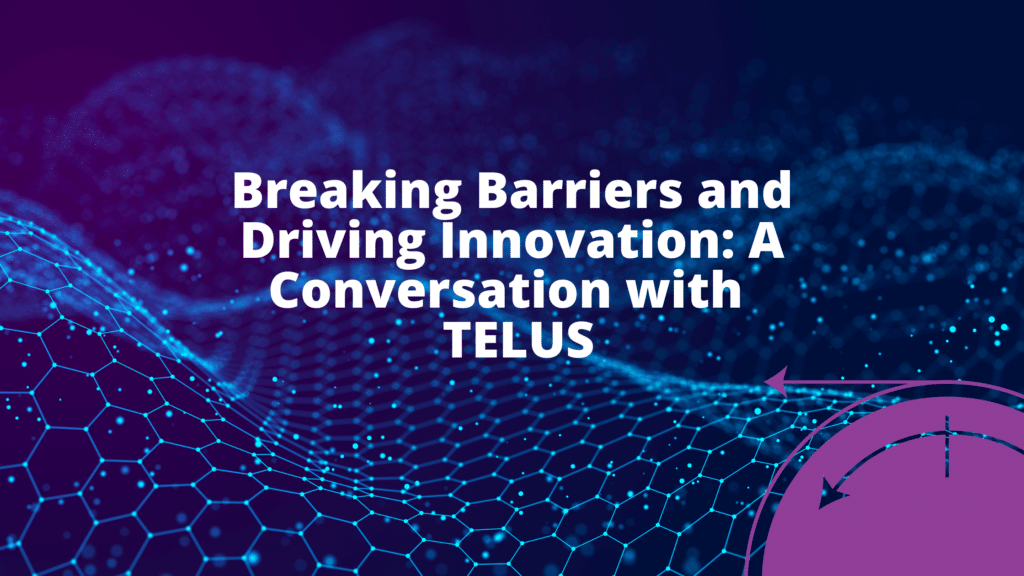
As National Engineering Month (NEM) Ontario continues, we are featuring leaders within Ontario’s engineering community who are pushing boundaries and shaping a better future. We sat down with Sana Tariq, Ph.D., Principal Architect, Cloud and Service Orchestration at TELUS, to discuss her inspiring journey, the groundbreaking projects she’s led, and the importance of fostering curiosity and diversity in engineering.
Q. Start by telling me a little bit about your background and your journey at TELUS.
Sana: I have a Ph.D. in computer science and started my career in the United States. In 2018, I joined TELUS as a Senior Architect and led the shift to cloud automation. Over the past eight years, I’ve modernized our infrastructure and applications. I’ve worked closely with the industry to tackle vendor and workload challenges, led industry initiatives, and contributed to open-source projects—a truly rewarding experience.
Q. Can you tell me what you’re currently working on?
As a Principal Architect at TELUS, I lead a team of senior architects on a mission to revolutionize our networks. We’re transforming both data and voice networks to be more cloud-native, transitioning away from legacy models. Our focus includes exploring cutting-edge technologies like IoT-connected cars and generative AI to enhance network experiences. I’m also pioneering work on Telco APIs, which I believe can be a game-changer for network monetization. It’s an exciting role where we evaluate emerging technologies and collaborate across teams to bring new ideas to life.
Q. Can you share a project or initiative that you’re particularly proud of?
I’m particularly proud of Project Nephio. While working on cloud workload automation, I recognized a gap between telco automation and the more efficient methods used by web-scale companies like Google. I proposed using Kubernetes natively to deploy telco workloads to the cloud—a novel approach in the telco world at the time. Google was enthusiastic about the idea, and we collaborated to launch the project as an open-source initiative under the Linux Foundation. What began as a small idea evolved into a major project involving 70 companies, 250 contributors, and four press releases. As the Chair of the Technical Steering Committee, I’ve seen firsthand how Project Nephio has revolutionized telco automation and fostered industry-wide collaboration.
Q. Is there a recent technological advancement that has inspired you?
I’m really excited about Generative AI (GenAI). We did a proof of concept with Amazon to automate template creation and data filling, and it was amazing, saving us a ton of time and cost. But what’s even more interesting is that we’re now exploring how GenAI can help with other challenges. For example, we’re looking at using it to improve documentation, make troubleshooting easier, enhance our architectural design, and create new code. It’s a game-changer because it automates a lot of the complex tasks, allowing us to focus on more strategic work. This work aligns with broader industry research, such as the insights shared in this recent Linux Foundation Networking whitepaper on GenAI’s role in network automation.
Q. How do you encourage your team to stay curious and adaptable in such a fast-evolving tech landscape?
One of the most important lessons I learned during my Ph.D. is that learning is never complete. I encourage my team to stay agile, keep learning, and embrace new technologies. We foster a culture where asking questions and brainstorming new ideas is celebrated. I also urge my team to leverage AI in their daily work, whether it’s understanding complex networks or optimizing workflows. This mindset helps us stay at the cutting edge.
Q. How does TELUS support learning, development, and mentorship for engineers at all career stages?
TELUS has a fantastic culture of openness and mentorship. We offer training programs, and there’s a strong emphasis on rotating through different teams to gain diverse experiences. For instance, the Graduate Technical Learning Program (GTLP) places fresh grads on rotation across teams to build a broad perspective before settling into a role. Leaders actively support growth and encourage engineers to attend conferences, present their work, and provide them opportunities of collaboration and innovation through our internal Technology and Engineering Community (TEC).
Q. What role does sustainability play in your work?
Sustainability is crucial, especially in cloud architecture. We focus on reducing carbon footprints by optimizing cloud resources. For example, automating the shutdown of idle compute resources and transitioning to smaller, more efficient microservices helps reduce energy consumption. Every step towards cloud agility indirectly improves sustainability by cutting costs and minimizing environmental impact.
Q. Looking back at your career, what key factors contributed to your success?
Success is a blend of hard work and destiny. I never planned to pursue a Ph.D., but when the opportunity arose, I took it and discovered a passion for research that reshaped my career. Similarly, applying to TELUS wasn’t meticulously planned, but it was one of the best decisions I ever made. I’ve been fortunate to encounter inspiring people and pivotal moments that guided my path.
Q. How do you foster diversity within your teams to drive innovation?
Diversity goes beyond gender and race; it encompasses different perspectives and experiences. I strive to create an inclusive environment where everyone feels heard and valued. Encouraging diverse viewpoints leads to richer discussions and better solutions. It’s an ongoing journey, but one that continually brings out the best in our team.
As we celebrate National Engineering Month, stories like Sana’s remind us of the power of innovation, diversity, and continuous learning in shaping the future of engineering. There are 31 days in March — 31 reasons to get involved with NEM and infinite opportunities to further Ontario’s engineering community. Attend events online and in person from March 1–31 at www.nemontario.ca/events.
